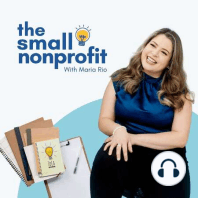39 min listen

upgrading your strategic planning process with Jennifer Riel
upgrading your strategic planning process with Jennifer Riel
ratings:
Length:
36 minutes
Released:
Mar 7, 2022
Format:
Podcast episode
Description
Strategic planning is one of those seemingly boring things that we need to do every once in a while to have a vision and clarity around where our organization is going. But I've never seen it done as an exciting or innovative process in most small organizations.In today’s episode, Jennifer Riel, IDEO’s global director of strategy (and probably one of the smartest people I’ve met), talks about how you can actually use that process to think about innovation and really have a strong impact on your organization.Myths that Jennifer wants us to walk away from:Strategy is about updating old plans: Doing the status quo may look risk-free, but it may be extremely risky because the world has changed, or we lack the capabilities, or whatever the case may be. Holding the same standard hinders us from seeing other possibilities that could lead us to where we want to be.Strategy is all about budget and a thick binder full of initiatives: Strategy is a set of choices. And a choice means yes to some things and a no to other things, giving things up, trading things off. Real choices. And those choices are about how you are going to try to win in a particular way.Jennifer’s thoughts around Strategy “Winning” for nonprofits: Strategy is about making choices that will allow you to win and for nonprofits, winning means achieving ambitions and creating the change that we want to see in the world. Jennifer encourages not for profits to think of choices about what they can uniquely do and what should they uniquely do to create the change that they are after?Start with human-centeredness: Understanding the context in which you are operating is important for nonprofits. You need to know what's happening in the community, what are the folks that you are working with, and what is it that is working for them or not? And use that to define the problem to be solved.Competitive advantage: For nonprofits, the competitive advantage is a reason a donor would give you the dollar instead of someone else, a reason to believe that you can achieve the outcome you're after more effectively or less expensively than someone else could. Knowing Your Capabilities: You need to know the capabilities and systems that you will need as an organization in order to implement your strategy. Be honest about where you are. Favourite Quotes from Today’s EpisodePost your favorite quote on social media to share with us!“The starting place is to use your existing understanding of the world, your collective wisdom as a leadership team to say what is the problem we need our new strategy to solve. Start there, then explore the possibilities. So don't try to get to that answer right away, diverge a little bit and explore different playing fields, different potential sources of advantage. Those are the two fundamental questions. “Resources from this EpisodePlaying to Win by Roger Martin Jennifer Riel LinkedIn Jennifer Riel TwitterThe Good Partnership
Released:
Mar 7, 2022
Format:
Podcast episode
Titles in the series (100)
The Legal Mistakes Your Small Charity is Making and How to Fix Them with Mark Blumberg by The Small Nonprofit